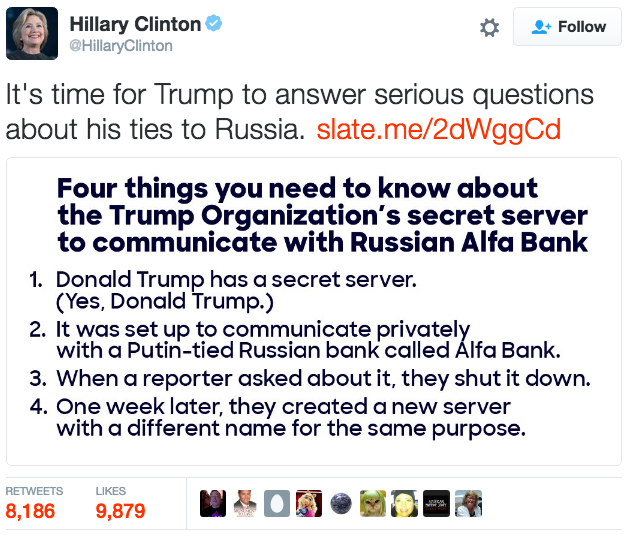
At the top of Hillary Clinton’s Twitter feed is a pinned tweet that links to a Franklin Foer story in Slate magazine headlined “Was a Trump Server Communicating With Russia?” The story isn’t poorly written so much as vaguely written. It never quite explains what exactly is going on or why it’s disconcerting. Clinton’s tweet recognizes that fatal flaw, so she summarizes and repackages it. “Four things you need to know about the Trump organization’s secret server to communicate with Russian Alfa Bank,” she says:

Political reporters loved the story and spread it far and wide:
In case the insanity of this is unclear, I repeat: Trump Org had a server designed to secretly, exclusively communicate with a Russian bank.
— Julia Ioffe (@juliaioffe) October 31, 2016
People on social media more knowledgeable of the underlying technology in play didn’t love it and began poking holes in it immediately. These tweets are the first of threads detailing some of the problems with the story, such as that there is no private server, and that it wasn’t set up to communicate with a Putin-tied Russian bank, and that it wasn’t shut down after a reporter inquiry, and wasn’t re-set up for the same purpose it never had.
So, ok. This is all a very exciting story, but it is almost entirely smoke when you actually dig into it. https://t.co/aorvPnX03L
— Pwn ███ The █████ b5 (@pwnallthethings) November 1, 2016
This Slate story is complete garbage https://t.co/lO8WG5d4ht
— Naadir Jeewa (@randomvariable) November 1, 2016
Within hours, the New York Times — the New York Times — had published a story that threw cold water on whatever exactly Foer was suggesting:
F.B.I. officials spent weeks examining computer data showing an odd stream of activity to a Trump Organization server and Alfa Bank. Computer logs obtained by The New York Times show that two servers at Alfa Bank sent more than 2,700 “look-up” messages — a first step for one system’s computers to talk to another — to a Trump-connected server beginning in the spring. But the F.B.I. ultimately concluded that there could be an innocuous explanation, like a marketing email or spam, for the computer contacts.
Editors started saying that they’d passed on the story when they’d been pitched it because it was such a nothingburger. Noah Schachtman of the Daily Beast said of its flaws, “that’s why we ultimately passed on it.” John Little of Blogs of War just said he passed on account of the anonymous sources. Sam Biddle at The Intercept said that “at least five outlets including The Intercept have been looking at this for weeks and decided it didn’t add up.”
But that wasn’t all. At the exact same time as Foer’s failed story dropped, a flurry of anonymously sourced stories all tried to hit the same drumbeat.
Reporters Ken Dilanian, Cynthia McFadden, William M. Arkin and Tom Winter wrote a piece claiming that an unspecified number of vague anonymous sources had told the quartet that a former Trump advisor was getting an, um, “FBI inquiry,” which is to say a preliminary examination and not a criminal investigation. There was no verification of this claim provided in the story.
Mother Jones’ David Corn reported that “A Veteran Spy Has Given the FBI Information Alleging a Russian Operation to Cultivate Donald Trump.” The story is built on a single anonymous primary source. There is no evidence to substantiate his claims. And while former intelligence officers speaking off the record happens about 200 times a day, one has to particularly appreciate the idea that this veteran spy leaked to Mother Jones, supposedly. All trustworthy but totally anonymous veteran spies who want to cast aspersions on Russia leak to Mother Jones. This particular combination is my favorite of yesterday’s opposition research dump. Or as Daniel Foster said, “It’s far more plausible that the [Mother Jones] story is a Russian op than it is that it’s true.”
Eamon Javers at CNBC wrote a story — with, you guessed it, a single anonymous source — claiming that FBI Director James Comey wouldn’t name Russia as meddling in the U.S. election and wouldn’t have the FBI’s name on a document saying as much. Eavers’ super-anonymous “former bureau official” says he heard that Comey privately thought it was too close to election day to make such statements. To quote a wise man, “I mean, seriously? What the hell kind of sourcing is this?”
By the fourth story, some reporters noted the obvious — that this was a coordinated “opposition research” dump, albeit a very poorly orchestrated one. Partisans pushed back and said it could have just been a coincidence that a bunch of half-baked pieces on the same theme all ran within hours of each other. (This was very different than the fights reporters had about whether the reopening of the investigation into Clinton’s mishandling of classified information should be covered.)
Here’s another coincidence! Sen. Harry Reid — who spent much of 2012 lying repeatedly about Mitt Romney not paying any taxes — got yesterday’s news going with a letter that just happened to be about, well look at that, Trump and Russia. What are the odds? It was also about how Comey, who was the best FBI director in the history of FBI directors when he let Hillary Clinton skate, is now the world’s most evil person and is violating the law by continuing to investigate the former Secretary of State for her mishandling of classified information.
Could We Up Our Standards A Tad?
We’re in the closing days of a contentious campaign. All campaigns have late dumps of real or made-up information designed to change the course of the election. Donna Brazile, herself embroiled in a scandal related to her repeated collusion with Clinton to help her in debate preparation, had to step down from the Dukakis campaign in 1988 for spreading a story about President George H. W. Bush cheating on his wife. George W. Bush had to deal with late-breaking news about an old DUI during his 2000 run.
Despite everything we’ve been told about Hillary Clinton being on track to win this election handily, her team is not taking any chances. Their coordinated dumps of information about Trump’s legendary handsiness and sexual entitlement were expertly deployed. The campaign’s coordination of the Alicia Machado story is something that could only be done with a very friendly press, but the Clinton camp did a great job setting up interviews and keeping all of the negative information about Machado at bay until the story was fully operational.
But as this failed Russia research dump shows, it pays to be a tad more diligent about how we cover these two candidates.
That’s particularly true when considering the rather bizarre and opposite response of kowtowing to Clinton demands that Friday’s news about the investigation being reopened instead be mostly about the formerly sainted Comey. Much of the coverage of the FBI chief has turned on a dime since he reopened the investigation, to the point that the New York Times is literally running this headline today:

As one Twitter wag responded:
Hillary Clinton's secrecy recalls Nixon's worst features, fairly or nothttps://t.co/lC2kmMc9A7 pic.twitter.com/VkIEZEGnX7
— PoliMath (@politicalmath) November 1, 2016
Some political reporters are focusing on Comey, as the Clinton campaign desires, and writing entire stories about standard procedures, designed to undermine the integrity of the story. As soon as the story broke, crowds of pundits and journalists rushed to minimize the scandal, ask questions of the FBI, and detract from the actual scandal of Clinton’s mishandling of classified information and Huma Abedin’s role in same.
Left by the wayside are explosive stories that haven’t even begun to be researched and reported on, such as the $28 million Hillary Clinton received, allegedly for favors to Morocco; and the fact that the Clinton Foundation itself is under FBI investigation for influence peddling, and the tangled web of a close Clinton ally giving a massive political donation to the wife of a top FBI investigator; and that investigator allegedly slow-walking the investigation into Huma Abedin past the election; and Comey going to Congress in part because of the problems with Clinton-compromised superiors and underlings.
Yes, there will be more opposition being dumped — at least by Clinton, since she is running the more conventional and skilled campaign. But let’s not get whipped up into easily debunked frenzies fueled by anonymous sources. In fact, let’s agree that the closer we are to an election, the less anonymity we will tolerate. The response to Clinton’s bad news about the FBI investigation is understandable from her perspective, but journalists shouldn’t get dragged down into the panic.









